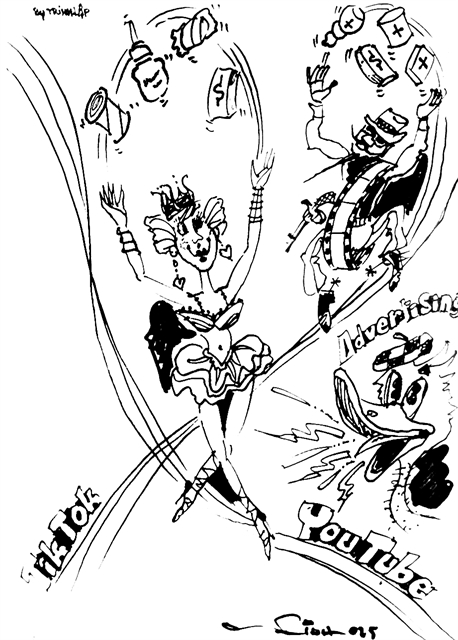 Talk Around Town
Talk Around Town

 |
| Illustration by Trịnh Lập |
By An Phương
In today’s online world, it’s no longer enough to simply entertain or sell. As the power of digital influence grows, so does the need for those with large platforms to act with integrity. What was once seen as a casual post or harmless endorsement now carries weight and consequences.
The line between entertainment and influence has blurred over recent years.
“From YouTubers and TikTok creators to livestream sellers and podcast hosts, today’s influencers are not just promoting products, they’re shaping values, setting trends, and at times, even impacting public opinion more strongly than traditional media,” my friend Thu Hoài, 35, told Việt Nam News.
In Việt Nam the influencer economy has flourished, with many young people aspiring to be content creators. But with visibility comes responsibility. The pressure to grow followers and monetise quickly often tempts creators to chase controversy or exaggerate stories for clicks.
More concerning, some have taken advantage of their audience's trust by promoting products of questionable origin or quality.
Counterfeit food and fake milk products have become alarmingly common, and many of these sales are linked to public figures, including actors and even beauty queens, who lent their names to endorsements.
Some did so out of carelessness, others knowingly, but in either case, the damage to consumer trust is real. Audiences are increasingly asking not just what influencers promote, but why.
The recent arrest and indictment of beauty queen N.T.T.T. has sparked intense public attention, following her alleged involvement in the business scandal surrounding K. vegetable candy.
The case drew headlines not only because of her celebrity status as Miss Grand International 2021 but also due to the striking details revealed during her testimony.
According to the Ministry of Public Security, she has been prosecuted for “deceiving customers”.
“I was really upset when I first heard about it as the beauty queen and the others had always been role models to me. I even bought the product and tried it a few times. It’s hard to believe they could take advantage of our trust like that. And honestly, I keep thinking about the parents who bought it for their kids, believing it was safe. That’s the part that hurts the most,” Đức Bảo, 24, said.
“What’s striking is how easily trust translates into action online. A well-lit photo, a glowing caption, and a famous face can convince thousands to buy, often without a second thought. In many cases, followers assume influencers have done the homework for them, that they’ve checked the safety, the source, and the science behind the product. But that assumption has proven dangerous,” he added.
To me, these cases reflect a deeper issue: the imbalance between influence and responsibility.
Many online personalities wield enormous persuasive power, yet few are held to clear ethical or professional standards.
When misinformation, counterfeit goods, or unverified medical treatments are pushed onto the public in the name of content creation or affiliate marketing, the consequences can be both personal and societal.
In response to growing concerns, the National Assembly on June 16 passed amendments to the Law on Advertisement, introducing new regulations aimed at tightening the responsibilities of celebrities and social media influencers.
The revised law gives individuals who disseminate advertising content the right to request full, accurate information from advertisers, including proof of quality and product legitimacy.
At the same time, influencers are obligated to comply with consumer protection rules, be transparent about product claims, fulfil tax duties, and provide relevant materials to authorities upon request.
They are legally accountable for any advertising that violates these standards.
“The rapid growth of social media in recent years has led to an explosion of online advertising,” said Anh Đức, 28, a digital marketing specialist.
“There are livestream sales sessions that last just a few minutes but can sell thousands of items. That shows how powerful this medium is. But the problem is, the legal framework hasn’t caught up with it, and there are too many gaps in regulation,” he said.
“A lot of times, once the truth comes out, people feel completely let down, like they’ve been tricked,” he added. “But what’s worse is that it chips away at public trust. And once that trust is broken, it’s not just one brand or one influencer that suffers. It casts doubt on everything.”
Many agree that the updated law is a much-needed step forward.
“If a product ends up harming consumers, the person promoting it can’t just shrug it off,” said Hoài. “Checking the quality and truthfulness of what you’re advertising shouldn’t be optional, it should be the bare minimum.”
Influence, after all, is not just a privilege, it’s a responsibility.
In an age when content travels faster than ever, the impact of one post can be far-reaching. It’s time we held influencers to the same standards we expect from any professional fields.
In the end, the digital age doesn’t just need more content, it needs more conscience. VNS




